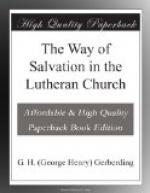Thus far we can safely go. This much in favor of the child, over against the adult, we freely admit. But this does not say that the child is innocent, pure and holy by nature. The undeveloped roots and germs of sin are still there. Its nature is evil. It must be saved from that moral nature. How?
Here again we meet those who have a very easy solution of the difficulty. They say: “Admitting that the child has sin, this will in no way endanger its salvation, because Christ died to take away sin. They have no conscious sin. Therefore, the atonement of Christ covers their case, and, without anything further, they pass into heaven, if they die in their infancy.”
This view seems to satisfy a great many well-meaning people. Without giving the matter any further thought, they dismiss it with this easy solution. Surely, did they stop to consider and examine this theory, they would see it has no foundation.
Christ’s atonement alone, and in itself, never saved a soul. It removed the obstacles that were in the way of our salvation, opened the way back to our Father’s house, purchased forgiveness and salvation for us. But all this profits the sinner nothing, so long as he is not brought into that way; so long as the salvation is not applied to him personally. Neither can we speak of salvation being applied to an unrenewed, sinful nature. We cannot even conceive of forgiveness for an unregenerate being. This would, indeed, be to take away the guilt of sin, while its power remained. It would be to save the sinner in and with his sin.
The position is utterly groundless. It is even contrary to reason. It assumes that a being who has in his heart, as a very part of his nature, the roots and germs of sin, can, with that heart unchanged, enter into the kingdom of God. It makes God look upon sin with allowance. It does violence to the holiness of His nature. It makes heaven the abode of the unclean.
No, no. It will not do. When men try to avoid what seem to them difficult and unwelcome doctrines of God’s Word, they run into far greater difficulties and contradictions. That child is conceived and born in sin. It is a child of wrath, dead in trespasses and in sins. Its nature must be cleansed and renewed. Otherwise, if it can be saved as it is, there are unregenerate souls in heaven!
Better abide by what is written, and believe that every one, infant or adult, who has been born of the flesh, must be born of the Spirit. Listen to the earnest words of Jesus as he emphasizes them with that solemn double affirmation, “Verily, verily, I say unto you, except a man be born again he cannot see the kingdom of God.” He repeats this sweeping declaration a second time. In the Greek it reads, Except any one be born again. The assertion is intended to embrace every human being. Lest this should be disputed, Jesus further says, “That which is born of the




